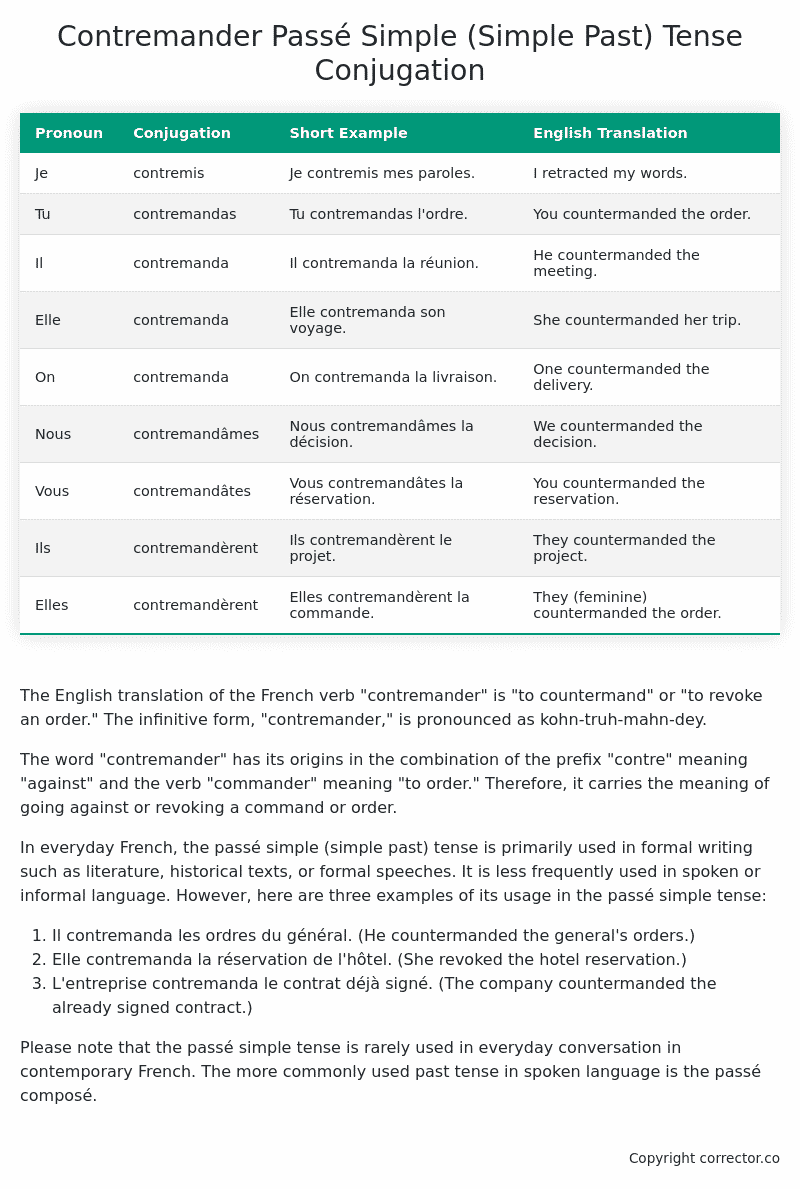Passé Simple (Simple Past) Tense Conjugation of the French Verb contremander
Introduction to the verb contremander
The English translation of the French verb “contremander” is “to countermand” or “to revoke an order.” The infinitive form, “contremander,” is pronounced as kohn-truh-mahn-dey.
The word “contremander” has its origins in the combination of the prefix “contre” meaning “against” and the verb “commander” meaning “to order.” Therefore, it carries the meaning of going against or revoking a command or order.
In everyday French, the passé simple (simple past) tense is primarily used in formal writing such as literature, historical texts, or formal speeches. It is less frequently used in spoken or informal language. However, here are three examples of its usage in the passé simple tense:
- Il contremanda les ordres du général. (He countermanded the general’s orders.)
- Elle contremanda la réservation de l’hôtel. (She revoked the hotel reservation.)
- L’entreprise contremanda le contrat déjà signé. (The company countermanded the already signed contract.)
Please note that the passé simple tense is rarely used in everyday conversation in contemporary French. The more commonly used past tense in spoken language is the passé composé.
Table of the Passé Simple (Simple Past) Tense Conjugation of contremander
| Pronoun | Conjugation | Short Example | English Translation |
|---|---|---|---|
| Je | contremis | Je contremis mes paroles. | I retracted my words. |
| Tu | contremandas | Tu contremandas l’ordre. | You countermanded the order. |
| Il | contremanda | Il contremanda la réunion. | He countermanded the meeting. |
| Elle | contremanda | Elle contremanda son voyage. | She countermanded her trip. |
| On | contremanda | On contremanda la livraison. | One countermanded the delivery. |
| Nous | contremandâmes | Nous contremandâmes la décision. | We countermanded the decision. |
| Vous | contremandâtes | Vous contremandâtes la réservation. | You countermanded the reservation. |
| Ils | contremandèrent | Ils contremandèrent le projet. | They countermanded the project. |
| Elles | contremandèrent | Elles contremandèrent la commande. | They (feminine) countermanded the order. |
Other Conjugations for Contremander.
Le Present (Present Tense) Conjugation of the French Verb contremander
Imparfait (Imperfect) Tense Conjugation of the French Verb contremander
Passé Simple (Simple Past) Tense Conjugation of the French Verb contremander (You’re reading it right now!)
Passé Composé (Present Perfect) Tense Conjugation of the French Verb contremander
Futur Simple (Simple Future) Tense Conjugation of the French Verb contremander
Futur Proche (Near Future) Tense Conjugation of the French Verb contremander
Plus-que-parfait (Pluperfect) Tense Conjugation of the French Verb contremander
Passé Antérieur (Past Anterior) Tense Conjugation of the French Verb contremander
Futur Antérieur (Future Anterior) Tense Conjugation of the French Verb contremander
Subjonctif Présent (Subjunctive Present) Tense Conjugation of the French Verb contremander
Subjonctif Passé (Subjunctive Past) Tense Conjugation of the French Verb contremander
Subjonctif Imparfait (Subjunctive Imperfect) Tense Conjugation of the French Verb contremander
Conditionnel Présent (Conditional Present) Tense Conjugation of the French Verb contremander
Conditionnel Passé (Conditional Past) Tense Conjugation of the French Verb contremander
Conditionnel Passé II (Conditional Past II) Tense Conjugation of the French Verb contremander
L’impératif Présent (Imperative Present) Tense Conjugation of the French Verb contremander
L’impératif Passé (Imperative Past) Tense Conjugation of the French Verb contremander
L’infinitif Présent (Infinitive Present) Tense Conjugation of the French Verb contremander
L’infinitif Passé (Infinitive Past) Tense Conjugation of the French Verb contremander
Le Participe Présent (Present Participle) Tense Conjugation of the French Verb contremander
Le Participe Passé (Past Participle) Tense Conjugation of the French Verb contremander
Struggling with French verbs or the language in general? Why not use our free French Grammar Checker – no registration required!
Get a FREE Download Study Sheet of this Conjugation 🔥
Simply right click the image below, click “save image” and get your free reference for the contremander Passé Simple tense conjugation!

Contremander – About the French Passé Simple (Simple Past) Tense
Formation
Usage
Narration
Historical Context
Interactions with other tenses
Passé Composé
Imparfait
Conditional and Subjunctive
Summary
I hope you enjoyed this article on the verb contremander. Still in a learning mood? Check out another TOTALLY random French verb conjugation!


